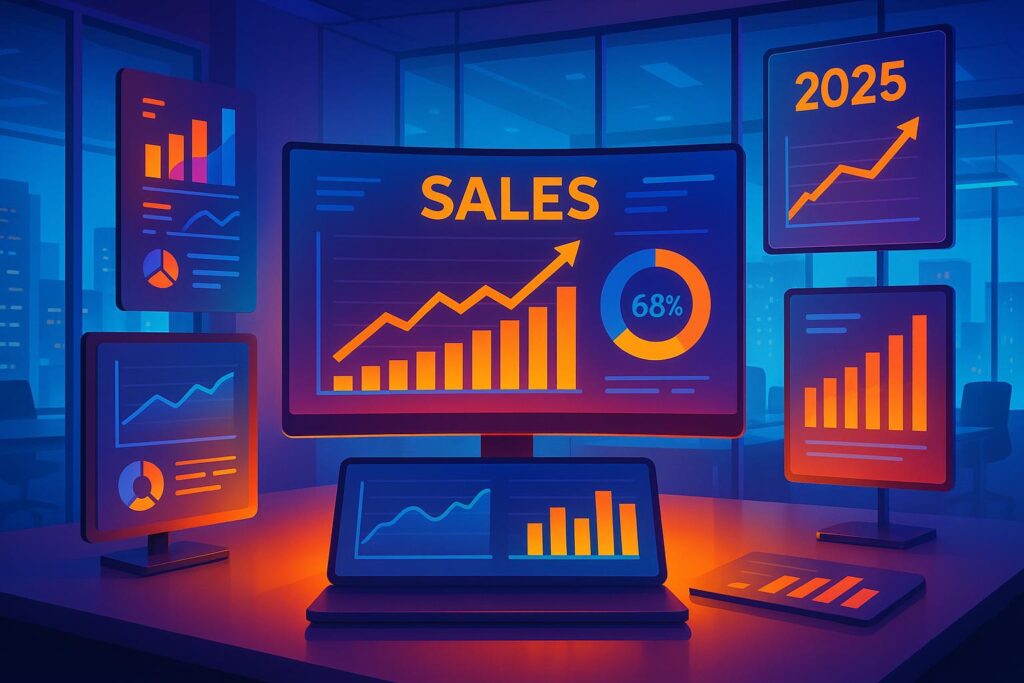Listen to the article
Sales enablement is undergoing a transformation with a new focus on sophisticated KPIs, AI, and analytics to optimise B2B sales performance in an increasingly complex landscape, promising significant business gains by 2025.
Sales enablement has rapidly evolved in recent years, fundamentally reshaping how businesses optimise their sales performance in the complex B2B landscape. According to a refreshed analysis by Aventi Group, sales enablement now hinges on a sophisticated set of Key Performance Indicators (KPIs) that go beyond traditional activity tracking to link directly with tangible business outcomes like pipeline acceleration, win rates, and customer expansion. This modern approach reflects the growing complexity of B2B buying processes, where larger buying committees, elongated sales cycles, and numerous digital touchpoints demand more nuanced measurement and enablement strategies.
At the core of this evolution are five pivotal KPIs identified for 2025: Lead-to-Customer Conversion Rate, Sales Cycle Length, Win Rate, Content Engagement Metrics, and Sales Training Effectiveness. Each of these KPIs offers crucial insights into sales performance and areas for enhancement. For instance, the lead-to-customer conversion rate measures the effectiveness of moving qualified leads through the sales funnel, now enhanced by AI-driven lead scoring and intent data, allowing sales reps to prioritise prospects actively in buying mode. Equally important is managing sales cycle length, which signals potential bottlenecks or rushed deals, with modern tools like deal intelligence and conversation analytics helping identify stalled opportunities and optimise handoffs among sales and marketing teams.
Win rates continue to serve as a key barometer of strategic effectiveness, with companies increasingly employing AI-based pattern analysis and structured win/loss interviews to refine messaging and sales tactics. Meanwhile, engagement with sales content—now measured by deeper metrics like scroll depth, video watch time, and influence on closed deals—enables better alignment of marketing and sales efforts and prioritisation of high-impact assets. Lastly, the effectiveness of sales training is gaining renewed focus, shifting from mere volume of training to measuring real performance improvements and retention, using tools such as conversation intelligence and AI-driven coaching. Tracking onboarding success through metrics like time to first deal for new hires is also an emerging trend.
The significance of these KPIs is underscored by industry data showing that 89% of B2B buyers regard their sales experience as a primary factor influencing purchase decisions, often outweighing price or product features. Effective sales enablement, therefore, depends not only on measurement but on turning data into actionable improvements that empower sales teams with the right content, training, and workflows.
Aventi Group complements these insights with practical service offerings designed to translate KPI data into enhanced sales outcomes. Their sales enablement solutions include developing tailored sales tools, leadership guidance on sales operations metrics, and targeted training programmes featuring webinars and role-play exercises. They report demonstrable results such as a 25% reduction in sales cycle time and a 30% increase in pipeline-to-quota ratios, illustrating the business impact of aligning enablement initiatives closely with measurable KPIs. Furthermore, the Aventi Sales Enablement Scorecard provides business leaders with a robust framework to assess sales process maturity, training effectiveness, and KPI completeness, helping to pinpoint areas needing improvement.
Beyond enablement metrics, Aventi also offers complementary go-to-market strategy and product launch services that ensure messaging, positioning, and execution align with broader business goals and revenue targets. These strategic services integrate market research and customer insights to craft focused plans and success metrics that reinforce sales enablement efforts.
As the sales environment continues to transform, the emphasis has firmly shifted towards data-driven, outcome-focused enablement strategies empowered by AI and analytics. Organisations seeking to boost sales performance in 2025 must adopt a holistic approach that not only tracks the right KPIs but also continuously refines sales processes and training based on these insights. Through this integration of advanced measurement, tailored training, and strategic support, businesses can significantly enhance sales productivity, customer engagement, and ultimately, revenue growth.
📌 Reference Map:
- Paragraph 1 – [1], [2]
- Paragraph 2 – [1], [2]
- Paragraph 3 – [1], [3], [4]
- Paragraph 4 – [1], [3], [4]
- Paragraph 5 – [1], [3], [5], [6]
- Paragraph 6 – [1], [2], [7]
Source: Fuse Wire Services


